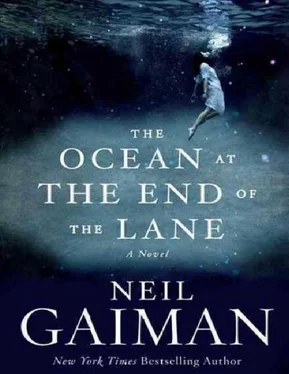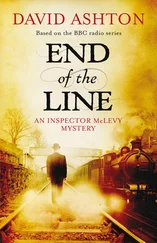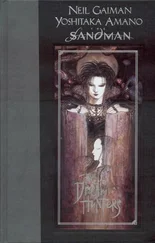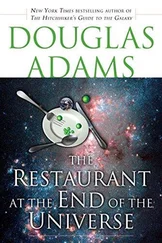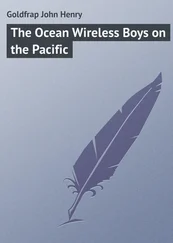A noise in the air, a horrible, twisted scratching noise, filled with pain and with wrongness, a noise that set my teeth on edge and made the kitten, its front paws resting on my chest, stiffen and its fur prickle. The little thing twisted and clawed up onto my shoulder, and it hissed and it spat. I looked up at Ursula Monkton. It was only when I saw her face that I knew what the noise was.
Ursula Monkton was laughing.
“Go back? When your people ripped the hole in Forever, I seized my chance. I could have ruled worlds, but I followed you, and I waited, and I had patience. I knew that sooner or later the bounds would loosen, that I would walk the true Earth, beneath the Sun of Heaven.” She wasnot laughing now. “Everything here is so weak, little girl. Everything breaks so easily. They want such simple things. I will take all I want from this world, like a child stuffing its fat little face with blackberries from a bush.”
I did not let go of Lettie’s hand, not this time. I stroked the kitten, whose needle-claws were digging into my shoulder, and I was bitten for my trouble, but the kitten’s bite was not hard, just scared.
Her voice came from all around us, as the storm-wind gusted. “You kept me away from here for a long time. But then you brought me a door, and I used him to carry me out of my cell. And what can you do now that I am out?”
Lettie didn’t seem angry. She thought about it, then she said, “I could make you a new door. Or, better still, I could get Granny to send you across the ocean, all the way to wherever you came from in the beginning.”
Ursula Monkton spat onto the grass, and a tiny ball of flame sputtered and fizzed on the ground, where the spit had fallen.
“Give me the boy,” was all she said. “He belongs to me. I came here inside him I own him”
“You don’t own nuffink, you don’t,” said Lettie Hempstock, angrily. “ ’Specially not him” Lettie helped me to my feet, and she stood behind me and put her arms around me. We were two children in a field in the night. Lettie held me, and I held the kitten, while above us and all around us a voice said,
“What will you do? Take him home with you? This world is a world of rules, little girl. He belongs to his parents, after all. Take him away and his parents will come to bring him home, and his parents belong to me.”
“I’m all bored of you now,” said Lettie Hempstock. “I gived you a chance. You’re on my land. Go away.”
As she said that, my skin felt like it did when I’d rubbed a balloon on my sweater, then touched it to my face and hair. Everything prickled and tickled. My hair was soaked, but even wet, it felt like it was starting to stand on end.
Lettie Hempstock held me tightly. “Don’t worry,” she whispered, and I was going to say something, to ask why I shouldn’t worry, what I had to be afraid of, when the field we were standing in began to glow.
It glowed golden. Every blade of grass glowed and glimmered, every leaf on every tree. Even the hedges were glowing. It was a warm light. It seemed, to my eyes, as if the soil beneath the grass had transmuted from base matter into pure light, and in the golden glow of the meadow the blue-white lightnings that still crackled around Ursula Monkton seemed much less impressive.
Ursula Monkton rose unsteadily, as if the air had just become hot and was carrying her upwards. Then Lettie Hempstock whispered old words into the world and the meadow exploded into a golden light. I saw Ursula Monkton swept up and away, although I felt no wind, but there had to be a wind, for she was flailing and tipping like a dead leaf in a gale. I watched her tumble into the night, and then Ursula Monkton and her lightnings were gone.
“Come on,” said Lettie Hempstock. “We should get you in front of a kitchen fire. And a hot bath. You’ll catch your death.” She let go of my hand, stopped hugging me, stepped back. The golden glow dimmed, so slowly, and then it was gone, leaving only vanishing glimmers and twinkles in the bushes, like the final moments of the fireworks on Bonfire Night.
“Is she dead?” I asked.
“No.”
“Then she’ll come back. And you’ll get in trouble.”
“That’s as may be,” said Lettie. “Are you hungry?”
She asked me, and I knew that I was. I had forgotten, somehow, but now I remembered. I was so hungry it hurt.
“Let’s see . . .” Lettie was talking as she led me through the fields. “You’re wet through. We’ll need to get you something to wear. I’ll have a look in the chest of drawers in the green bedroom. I think Cousin Japeth left some of his clothes there when he went offto fight in the Mouse Wars. He wasn’t much bigger than you.”
The kitten was licking my fingers with a small, rough tongue.
“I found a kitten,” I said.
“I can see that. She must have followed you back from the fields where you pulled her up.”
“This is that kitten? The same one that I picked?”
“Yup. Did she tell you her name, yet?”
“No. Do they do that?”
“Sometimes. If you listen.”
I saw the lights of the Hempstocks’ farm in front of us, welcoming, and I was cheered, although I could not understand how we had got from the field we were in to the farmhouse so quickly.
“You were lucky,” said Lettie. “Fifteen feet further back, and the field belongs to Colin Anders.” “You would have come anyway,” I told her. “You would have saved me.”
She squeezed my arm with her hand but she said nothing.
I said, “Lettie. I don’t want to go home.” That was not true. I wanted to go home more than anything, just not to the place I had fled that night. I wanted to go back to the home I had lived in
before the opal miner had killed himself in our little white Mini, or before he had run over my kitten.
The ball of dark fur pressed itself into my chest, and I wished she was my kitten, and knew that she was not. The rain had become a drizzle once again.
We splashed through deep puddles, Lettie in her Wellington boots, my stinging feet bare. The smell of manure was sharp in the air as we reached the farmyard, and then we walked through a side door and into the huge farmhouse kitchen.
Lettie’s mother was prodding the huge fireplace with a poker, pushing the burning logs together.
Old Mrs. Hempstock was stirring a bulbous pot onthe stove with a large wooden spoon. She lifted the spoon to her mouth, blew on it theatrically, sipped from it, pursed her lips, then added a pinch of something and a fistful of something else to it. She turned down the flame. Then she looked at me, from my wet hair to my bare feet, which were blue with cold. As I stood there a puddle began to appear on the flagstone floor around me, and the drips of water from my dressing gown splashed into it.
“Hot bath,” said Old Mrs. Hempstock. “Or he’ll catch his death.”
“That was what I said,” said Lettie.
Lettie’s mother was already hauling a tin bath from beneath the kitchen table, and filling it with steaming water from the enormous black kettle that hung above the fireplace. Pots of cold water were added until she pronounced it the perfect temperature.
“Right. In you go,” said Old Mrs. Hempstock. “Spit-spot.”
I looked at her, horrified. Was I going to have to undress in front of people I didn’t know?
“We’ll wash your clothes, and dry them for you, and mend that dressing gown,” said Lettie’s mother, and she took the dressing gown from me, and she took the kitten, which I had barely realized I was still holding, and then she walked away.
As quickly as possible I shed my red nylon pajamas—the bottoms were soaked and the legs were now ragged and ripped and would never be whole again. I dipped my fingers into the water, then I climbed in and sat down on the tin floor of the bath in that reassuring kitchen in front of the huge fire, and I leaned back in the hot water. My feet began to throb as they came back to life. I knew that naked was wrong, but the Hempstocks seemed indifferent to my nakedness: Lettie was gone, and my pajamas and dressing gown with her; her mother was getting out knives, forks, spoons, little jugs and bigger jugs, carving knives and wooden trenchers, and arranging them about the table.
Читать дальше
